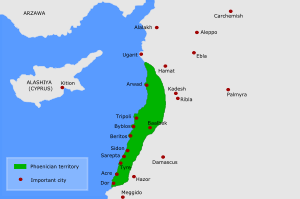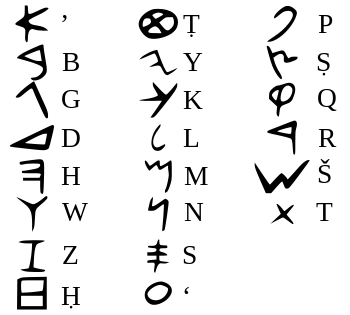Ancient History/Ancient Near East/Levant/Phoenicia
< Ancient History < Ancient Near East < LevantPhoenicia was an ancient civilization centered in the north of ancient Canaan, with its heartland along the coastal regions of modern day Lebanon, extending to parts of Israel, Syria and the Palestinian territories. Phoenician civilization was an enterprising maritime trading culture that spread across the Mediterranean during the period 1550 BC to 300 BC. Though ancient boundaries of such city-centered cultures fluctuated, the city of Tyre seems to have been the southernmost. Sarepta (modern day Sarafand) between Sidon and Tyre, is the most thoroughly excavated city of the Phoenician homeland. The Phoenicians often traded by means of a galley, a man-powered sailing vessel and are credited with the invention of the bireme
Introduction to Phoenicia
Phoenicia was an area containing today's Lebanon and areas above it, comprised of nine autonomous city-states. In spite of being divided as such, the Phoenicians were very closely confederated; that is to say that their societies were very similar to each other in script, religion, and inter-city games.
Geographically, Phoenicia was very well off. Right to the east there used to be a cedar forest, and further on there were hills. Except for the Romans (who caused the Phoenician civilization to become extinct), no other empire had ever dominated Phoenicia. This is due to the fact that the Phoenicians were commercially very important to other cultures.

Economy
Phoenician economy was a civilization entirely based on maritime commerce and seafaring.
Culture
Structure of Phoenician Society
Phoenicia was divided into nine autonomous city-states, each with their own absolute ruler.
They had a very mobile society, in which, either by luck or competence, one could move between social echelons.
Phoenician Religion
The Phoenicians were polytheists. Their main god was Baal. Baal (ba'al), plural Baalim (ba'allm) [Semitic,= possessor], name used throughout the Old Testament for the deity or deities of Canaan. The term was originally applied to various local gods, but by the time of the Ugarit tablets (14th cent. B.C.), Baal had become the ruler of the universe. Baal (Hadad) is regularly denominated "the son of Dagan," although Dagan (biblical Dagon) does not appear as an actor in the mythological texts. Baal also bears the titles "Rider of the Clouds," "Almighty," and "Lord of the Earth."
Baal is also called El however in the Ugaritic myths he's depicted as son of El, The first Canaanite god. Ba'al who died was resurrected by El's daughter Anat.
They were the only people of the Middle East to sacrifice humans; those being sacrificed had to be pure in the sense of not working and being a virgin. This meant that children were the only ones that were sacrifices for the gods. There were many temples of Baal in Canaan, and the name Baal was often added to that of a locality, e.g., Baal-peor, Baal-hazor, Baal-hermon. The Baal cult penetrated Israel and at times led to a syncretism. The practices of holy prostitution and child sacrifice were especially abhorrent to the Hebrew prophets, who denounced the cult and its "high places" (temples).
Phoenician Sports
The Phoenicians held inter-city games, similar to those of the Greeks. For the Phoenicians, the city that won the games won it because the patron god of the city had helped them; this would mean that all the other cities should pay reverence to that god until the next games.The Phoenicians also had a palestra which was a gym or wrestling school.

Contributions
The Phoenicians had numerous special methods of boat-making that are still used to this day, including the design of a boat and how to make it impermeable.
More importantly, though, was the contribution of the first alphabet (originally used to ease communication with other people, giving rise to cognates and new scripts).